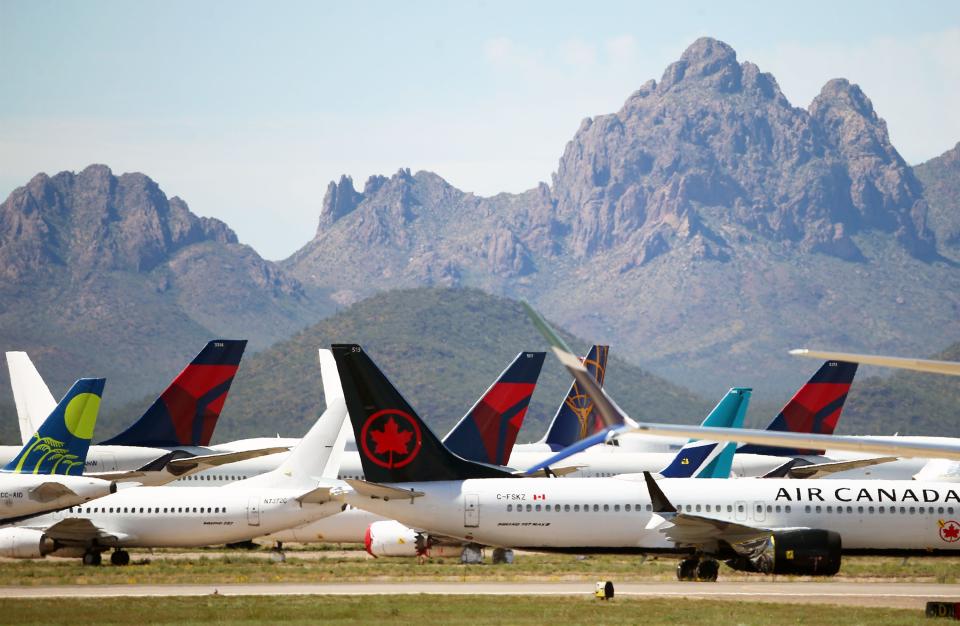Coronavirus collapse: Airlines and the 10 million jobs they support need a lifeline
On the morning of Sep. 11, 2001, I remember walking across the street toward the Capitol. I was looking forward to presiding over the floor of the House of Representatives as the congressman from Illinois’ 18th district. It was a gorgeous day, with blue skies and a balmy temperature.
I know I don’t need to explain how much changed that day or to rehash the terror and pain everyone experienced. But I do think we need to take a look at the lesson learned in the weeks and months that followed, given the crisis our country is currently facing.
At the time of the 9/11 terror attacks, the first industry to be hit was the airlines. The U.S. government grounded all flights to secure our nation and guarantee our safety. It was the right call. It was also devastating. It was devastating for our nation’s pilots, flight attendants and other aviation professionals, as well as for passengers and for our national economy. And even years later, when I was appointed by then-President Barack Obama to serve as secretary of Transportation, I still witnessed the long-term effects of that devastation.
Plunging demand and no end in sight
Today, as I watch the coronavirus crisis unfold, I fear that this public health crisis may have a greater impact on our airlines, aviation professionals and national economy. As with our response to 9/11, Congress needs to act fast.
At the beginning of this crisis, it appeared as though the airlines would be able to weather the storm, thanks to careful planning and smart decisions meant to cover a future crisis. But government restrictions and widespread guidance to limit travel and social interactions have resulted in a sharp decline in bookings and a significant uptick in cancellations. In fact, multiple countries are considering bans on travel. The European Union is considering a ban on flights into its 27 member countries.
The reality is that even the largest rainy-day fund would not be able to cover the downturn in demand that the aviation industry is facing, and the uncertainty of when it will end is cause for great concern. The bottom line is airlines are businesses, and a business can’t keep paying its employees if it lacks the revenue to do so.

I can think of no decision more painful. The heart of the airline industry is its people — the men and women who fly the planes, maintain the fleet, and support the passengers. They are the ones who built aviation into the economic engine that drives so many other aspects of our economy. And these are well-paying, union jobs that support families and homes in countless communities across the country — jobs that help make up America’s middle class.
Stay at home: Coronavirus fight needs paid sick leave to protect the health of all Americans
After 9/11, the men and women of the industry lost jobs, pensions, benefits and stability. We cannot let them go through that again. And while all airlines are taking action to cut costs — from changing schedules to freezing hiring — that is not a long-term solution. In other words, aviation needs additional support to protect these crucial jobs and help these men and women continue to fuel America’s economy and provide for their families, especially now.
U.S. airlines employ 750,000 people, but that’s just the start of the story. More than 10 million U.S. jobs rely on a strong aviation industry, from those who fly and maintain aircraft to the taxi drivers and shop workers that rely on air traffic to keep their business running. More than 7% of jobs in our country are directly or indirectly attributable to commercial aviation, in major hub cities like Phoenix and Charlotte, North Carolina, but also in small and medium communities from coast to coast as well.
Aviation is a vital economic engine
In total, the economic growth these men and women drive is responsible for over 5% of the U.S. Gross Domestic Product. With the financial impact of this health crisis expected to be far-reaching, that economic engine is more important than ever, and we need to take it seriously when the experts are telling us it could fall apart.
Mike Pence: We need the American people's help to fight coronavirus now
Members of Congress and the Trump Administration are considering a third large-scale package to stimulate the economy and provide much-needed support to industries impacted by the pandemic. It is critical that the package include a series of investments to protect the aviation workers and this vital driver of our economy — in the form of grants, loan guarantees and tax relief.
Now is not the time to delay. Immediate, intelligent action will save livelihoods and help our economy recover. Congress needs to move to support the men and women of the airline industry before it is too late. They have been there for this country, keeping us safe in the skies and allowing us to travel for business and to visit loved ones. They need a lifeline. Our economy and millions of workers cannot afford a delay.
Ray LaHood, a former Republican congressman from Peoria, Illinois, was the 16th U.S. Secretary of Transportation. Follow him on Twitter: @RayLaHood
You can read diverse opinions from our Board of Contributors and other writers on the Opinion front page, on Twitter @usatodayopinion and in our daily Opinion newsletter. To respond to a column, submit a comment to letters@usatoday.com.
This article originally appeared on USA TODAY: Coronavirus crisis: Save aviation and the 10 million jobs it supports

